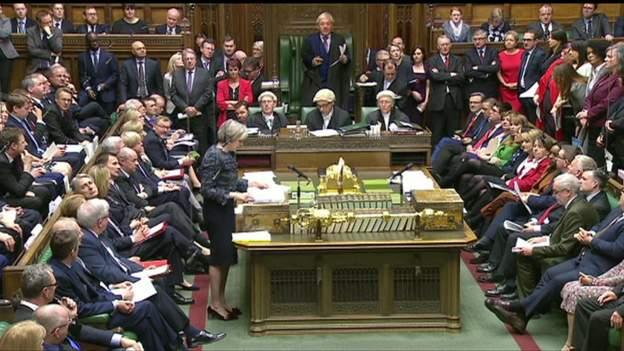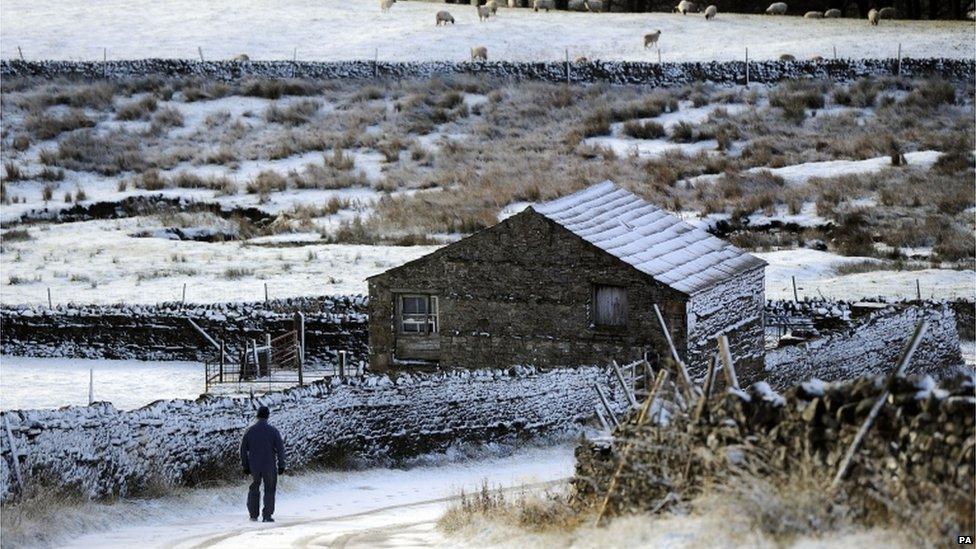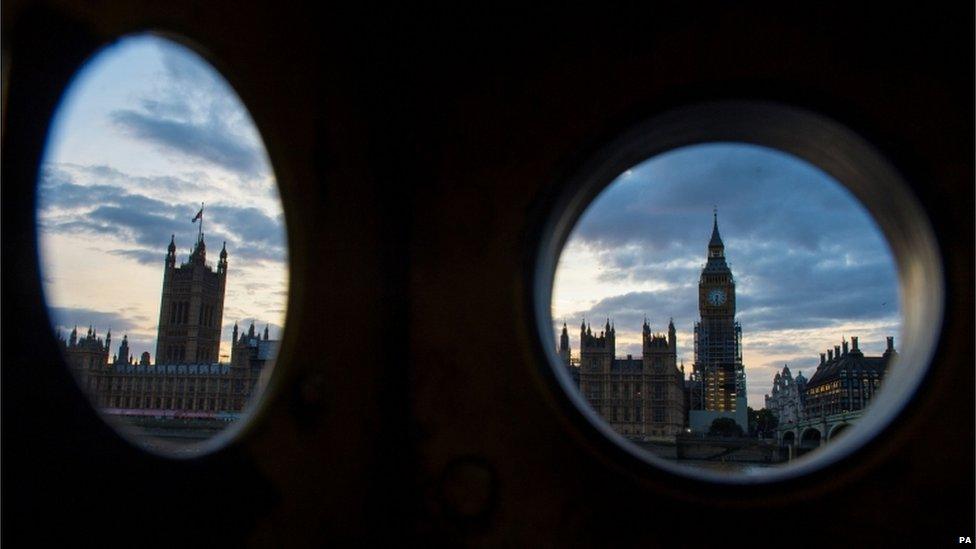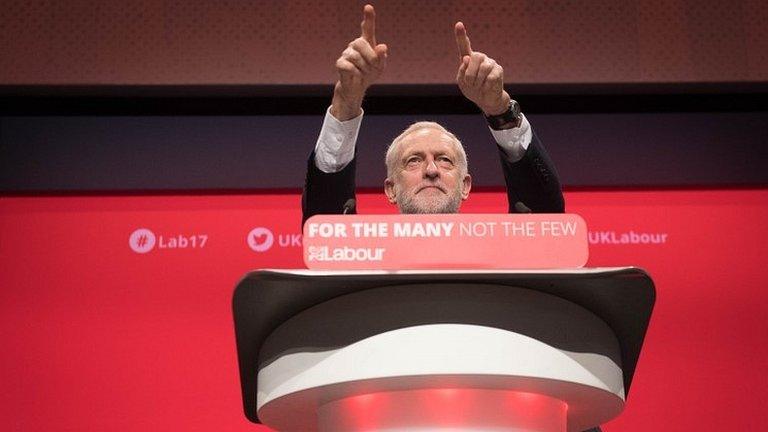Week ahead in Parliament
- Published
- comments

Will Mrs May face a testing time at PMQs on Wednesday?
It's not quite "back to Brexit" as Parliament re-assembles after the conference break - the over-riding issue of British politics does not feature much in a rather humdrum agenda for the first week back.
The main excitement of the week is likely to revolve around ministerial statements and urgent questions. There are plenty of topics to raise: Labour might want to ask about the government's plans on housebuilding and student finance, while the All Party Parliamentary Group on Catalonia is likely to query the government's response to the crisis over its independence referendum, if one of the political parties doesn't get there first.
And, of course, the prime minister will face a testing question time on Wednesday. Will her performance squash talk of a leadership challenge or stoke the speculation to a new fever pitch?
One point to note is that a number of SNP MPs will miss the early part of the week because they will be attending their party conference in Glasgow; reinforcing their longstanding complaint that Parliament doesn't accommodate their gathering, but does tailor its sittings to the needs of the much smaller Lib Dem contingent.
Here's my rundown of the week ahead:
Monday
In the Commons (2.30pm) MPs open with Work and Pensions questions - after which a number of post recess statements and urgent questions can be expected - they may spill over into Tuesday, too.
And the day's main debate is on Gypsies and Travellers and local communities.
The adjournment debate led by Labour's Karin Smyth, is on the use and control of air rifles - she has called for tougher controls following an incident in which an 18-month-old toddler was shot in the head in her constituency.
On the committee corridor, the Public Accounts Committee has a hearing (4pm) into Hinckley Point C. The estimated construction cost for the new-generation nuclear power station was £18bn, and in a report last June, the National Audit Office warned that it would be impossible to know for decades whether this would prove good value for money for the taxpayer.
In the Lords (2.30pm) questions to ministers will cover the policing costs of fracking, the prospects for reaching a Brexit agreement by March 2019, reforming the Work Capability Assessment and the impact of the fall in the value of the pound against the euro.
The day's main legislating is the second reading debate on the Telecommunications Infrastructure (Relief from Non-Domestic Rates) Bill, external and that will be followed by debates on two select committee reports - the Constitution Committee's on inter-governmental relations in the UK and the union, external, and the report from the EU Committee Brexit: devolution, external.
Tuesday
The Commons begins (11.30am) with Health questions, and it is quite likely that more post-recess ministerial statements and urgent questions could follow.
There's a Ten Minute Rule motion from Labour's Paul Flynn calling for the legalisation of cannabis for medicinal purposes.
Mr Flynn is a long-standing campaigner on this issue. In July, he urged campaigners to come to parliament and smoke cannabis there, accusing MPs of "culpable cowardice" for failing to challenge the "barbaric stupidity" of a government policy which denied MS sufferers and chemotherapy patients the right to use the drug.
The main legislating should be a pretty perfunctory discussion of the European Union (Approvals) Bill, external, with the committee, report and third reading stages taken at a single gulp. The bill would rubber-stamp draft EU proposals to allow Albania and Serbia to be observers in the EU's Fundamental Rights Agency, external, and approve an agreement between the EU and Canada on competition laws.
The main debate is on baby loss awareness week - a subject that has produced some shattering speeches in the past, from MPs who have lost a child.

Is Yorkshire being left behind after devolution deals for Manchester and the West Midlands?
The adjournment debate, led by Labour's John Grogan, is on devolution for Yorkshire. There are fears that the region is being left behind after the government handed new powers to Greater Manchester and the West Midlands. An attempt to broker a devolution deal giving greater powers to an elected mayor for the Sheffield city region has become bogged down, and Mr Grogan argues that ministers should, instead, consider a devolution deal for all of Yorkshire.
In Westminster Hall, debates kick off with the Labour MP Steve McCabe on tackling aggressive antisocial behaviour (9.30am- 11am). Mr McCabe, who suffered facial injuries after being hit with a brick by an attacker on a motorcycle, is calling for much more robust action to tackle the rising crime and aggressive anti-social behaviour which, he says, is plaguing neighbourhoods right across Birmingham.
Plaid Cymru's Hywel Williams has a debate on the effect of the Catalan independence referendum on the EU (11am-11.30am) and the Conservative former MEP Vicky Ford leads a debate on the effect of UK leaving the EU on consumers and consumer protection (2.30pm- 4pm).
The final debate is on the future funding of supported housing - led by the Conservative Peter Aldous, who led an inquiry into this issue in the last parliament (4pm-4.30pm).
There are different types of supported housing - catering to people with physical and mental disabilities or simply old age - or who need for a safe refuge from violence.
The government is about to reshape the funding for this kind of housing - the core costs will come from the new Universal Credit benefit, which will absorb what's now Housing Benefit - and local councils will, if necessary, top it up. And there are fears in the sector that they will be caught in an increasing spending clampdown.
My select committee pick is the Home Affairs hearing (2.30pm) on the Home Office's ability to regulate immigration, and provide accurate and timely decisions on people's immigration status, in the wake of the Brexit referendum. But the Business Committee hearing (10.45am) on 21st Century employment practices, with Uber, Hermes and Deliveroo, suddenly looks rather topical.
In the Lords (2.30pm) ministers face questions on disaster relief operations in the Caribbean, after Hurricane Irma, international students and migration figures and a register of perpetrators of domestic violence.
The day's main event is the second reading debate on the Data Protection Bill, external, which will tighten safeguards around the use companies make of people's personal data - for example, it will make it simpler for people to withdraw consent for the use of their personal data, or ask for it to be erased. And it will create new criminal offences - to deter organisations from either intentionally or recklessly creating situations where someone could be identified from anonymised data.
Wednesday
The Commons opens (11.30am) with questions to Cabinet Office ministers and Chancellor of the Duchy of Lancaster, and at noon: Prime Minister's Question Time returns.
The Conservative Antoinette Sandbach has a bill to regulate the sale of foetal dopplers - heart monitors which can allow parents to listen to their child's heartbeat in the womb. Some varieties use ultrasound and there are concerns that they may be damaging, and there are also worries that being able to hear a heartbeat - or what an untrained person may think is a heartbeat - may provide false reassurance if there are other signs of problems in a pregnancy.
Then MPs turn to the detail of the Finance Bill, external - in a committee of the whole House. This covers measures announced in the Budget, in March, but dropped because they could not be rushed through before the snap election.
Its contents include new penalties for those who enable the use of tax avoidance schemes that are later defeated by HMRC, an update on the rules concerning company interest expenses, to ensure big businesses cannot use excessive interest payments to reduce the amount of tax they pay and changes to prevent individuals from using artificial schemes to avoid paying the tax they owe on their earnings.
Other issues to watch include termination payments, where the government wants the power to reduce the tax free amounts people receive, if made redundant. And Labour are also concerned that the proposals on Business Investment Relief could be used by non-doms as a vehicle for avoiding tax.
The adjournment debate, led by the Conservative Dr Andrew Murrison, is on the increasingly controversial subject of university vice-chancellors' pay.
Westminster Hall debates include: human rights in Iran, from Theresa Villiers (9.30am- 11am); the regulation of HGV drivers sleeping in their vehicles from Gordon Henderson (11am - 11.30am) and Royal Mail delivery office closures, from Labour's Helen Hayes (2.30pm - 4pm).
The final debate (4.30pm- 5.30pm) is on the effect of the arts on health - led by the former arts minister Ed Vaizey, who now chairs an All-Party Parliamentary Group on the issue; it argues that the arts can help meet major challenges facing health and social care: ageing, long-term conditions, loneliness and mental health. And in doing say they believe the arts can help save money in the NHS and in social care.
On the committee corridor, watch out for a Procedure Committee hearing (2.45pm) with the former Attorney General Sir Dominic Grieve, looking at the ways Parliament might process the vast amount of secondary legislation generated by Brexit.
This will be an important taster for what will probably be the key debate on the detail of the EU Withdrawal Bill - where his amendment (co-signed by such luminaries as Ken Clarke, Nicky Morgan, Anna Soubry and John Penrose) is probably the one most likely to be carried.

HMS Queen Elizabeth undergoing sea trials in August, with the USS George HW Bush and her carrier strike group
Public Accounts has a hearing on Delivering Carrier Strike (2.30pm), examining progress in the giant procurement programme to replace the Navy's Invincible class aircraft carriers - the two new Queen Elizabeth Class carriers will cost £6.2bn, their 138 Lightning II aircraft are forecast to cost £5.8bn and the new Crowsnest airborne radar system to protect them is estimated to cost £300m. The session will focus on how the Ministry of Defence is managing a high-risk programme involving new technologies.
There's a joint hearing of the Business, Energy and Industrial Strategy and the Work and Pensions committees (10am) with Mathew Taylor, author of Good work: the Taylor review of modern working practices, external on the gig economy.
The Communities and Local Government Committee has a "getting to know you" evidence session with Secretary of State Sajid Javid (4pm), and Digital, Culture, Media and Sport similarly has a hearing with Secretary of State Karen Bradley (2.30pm).
In the Lords (3pm) questions to ministers range across maintaining benefits to the UK arising from EU students studying at UK universities, human rights violations against the Royingya people in Burma and the broadcasting code in relation to smoking on reality TV.
The day's legislating is on the Armed Forces (Flexible Working) Bill, external - which aims to help regular personnel who are forced out of the services, because they are unable to meet their unlimited military commitments.
The argument is that this results in the loss of valuable knowledge, skills and experience, and that, in turn, impacts on operational capability and increases defence costs. The bill allows temporary periods of flexibility in service careers.
That is followed by a short debate on implementing the report from the Farmer Review, The Importance of Prisoners' Family Ties for Reform: Preventing Reoffending and Reducing Intergenerational Crime - led by the eponymous Lord Farmer.
Thursday
The Commons meets at 9.30am for International Trade questions, followed at 10am by Women and Equalities questions, and then (if no urgent questions or ministerial statements intrude) by the weekly Commons Business Statement from the Leader of the House, Andrea Leadsom.

MPs will be waiting to see if a debate on the restoration and renewal of Westminster is announced
Watch out for announcements on a debate on the restoration and renewal of the Palace of Westminster (code for the question of whether MPs and peers will have to move out to make way for a multi-billion pound restoration programme) and for the start of the detailed committee stage consideration of the EU (Withdrawal) Bill.
That is followed by a general debate on one of the big Brexit issues - Exiting the European Union and data protection, where major issues need to be resolved.
In Westminster Hall (1.30pm) the Conservative Wendy Morton leads a debate on unauthorised encampments. That will be followed by a further, as yet unspecified debate at 3pm.
On the committee corridor, there's a Public Accounts hearing (10.30am) on the Department for Education's accounts - this is expected to centre on the risk of financial failure in schools in the £76.1bn budget, which goes on grants to schools and colleges.
In the Lords (11am), question time covers government reporting to Parliament on a financial settlement with the EU and creating extra capacity on the railways.
The afternoon's debates are on subjects raised by Labour backbenchers, starting with Lord Smith of Leigh on the availability and affordability of housing, and followed by the future of work, and the public policy response to change led by the former Education Minister Lord Knight of Weymouth.
Neither House sits on Friday 13 October.
- Published27 September 2017
